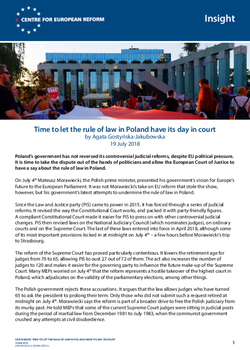
Time to let the rule of law in Poland have its day in court
Poland’s government has not reversed its controversial judicial reforms, despite EU political pressure. It is time to take the dispute out of the hands of politicians and allow the European Court of Justice to have a say about the rule of law in Poland.
On July 4th Mateusz Morawiecki, the Polish prime minister, presented his government’s vision for Europe’s future to the European Parliament. It was not Morawiecki’s take on EU reform that stole the show, however, but his government’s latest attempts to undermine the rule of law in Poland.
Since the Law and Justice party (PiS) came to power in 2015, it has forced through a series of judicial reforms. It revised the way the Constitutional Court works, and packed it with party-friendly figures. A compliant Constitutional Court made it easier for PiS to press on with other controversial judicial changes. PiS then revised laws on the National Judiciary Council (which nominates judges), on ordinary courts and on the Supreme Court. The last of these laws entered into force in April 2018, although some of its most important provisions kicked in at midnight on July 4th – a few hours before Morawiecki’s trip to Strasbourg.
The reform of the Supreme Court has proved particularly contentious. It lowers the retirement age for judges from 70 to 65, allowing PiS to oust 27 out of 72 of them. The act also increases the number of judges to 120 and makes it easier for the governing party to influence the future make-up of the Supreme Court. Many MEPs worried on July 4th that the reform represents a hostile takeover of the highest court in Poland, which adjudicates on the validity of the parliamentary elections, among other things.
The Polish government rejects these accusations. It argues that the law allows judges who have turned 65 to ask the president to prolong their term. Only those who did not submit such a request retired at midnight on July 4th. Morawiecki says the reform is part of a broader drive to free the Polish judiciary from its murky past. He told MEPs that some of the current Supreme Court judges were sitting in judicial posts during the period of martial law from December 1981 to July 1983, when the communist government crushed any attempts at civil disobedience.
But in 1990, the year after the fall of communism, already around 80 per cent of the Supreme Court’s judges were replaced after a vetting procedure. And, at the time of Morawiecki’s speech in Strasbourg, there were reported to be no more than three Supreme Court judges who had been in judicial posts during the period of martial law. Opponents of PiS say the party is using the country’s communist past as a pretext for strengthening its influence over the courts. Before the president decides whether to prolong the term of judges who have turned 65, he consults the National Judiciary Council. Its impartiality has been called into question, because the members are now selected by the PiS-controlled parliament.
The Commission fears that the deterioration of rule of law in #Poland will have EU-wide implications in areas such as the single market or justice and home affairs.
Małgorzata Gersdorf, the 65-year-old president of the Supreme Court, has joined the chorus of criticism and refused to abide by the reforms. She says that a court whose make-up can be changed easily will find it more difficult to remain independent. Gersdorf has argued that her six-year term, which ends in 2020, cannot be shortened by the new legislation because it is directly guaranteed by the constitution. She has refused to step down or ask the president to prolong her term. While Morawiecki was addressing MEPs, Gersdorf went to work as if nothing had happened.
Like MEPs, the European Commission worries about the state of the rule of law in Poland. The Commission fears that the deterioration of rule of law in Poland will have EU-wide implications in areas such as the single market or justice and home affairs (JHA). These areas have worked well precisely because member-states have relied on each other’s ability to apply or implement EU rules and to enforce them if necessary - a member-state which undermines the independence of its own judiciary upsets this trust. In March 2018, an Irish judge questioned whether Poland was still a reliable partner. The judge halted the extradition of a Polish national because she was worried that the judicial reforms could affect his right to a fair trial, and asked the European Court of Justice (ECJ) for further guidance. The ECJ will make its ruling on July 25th.
The European Commission has failed so far to convince the Polish government to address its concerns. In December 2017 it activated Article 7 of the Treaty on European Union (TEU) for the first time which commits member-states to respond to systematic threats to the rule of law in the EU, and can potentially lead to the suspension of a member-state’s voting rights. The Commission hoped that political pressure from fellow member-states would help to bring Warsaw to heel, thinking the Polish government would find it more difficult to ignore criticism from other democratically elected EU leaders, rather than from the technocratic Commission.
The Article 7 multi-stage procedure, however, has proved ineffective in addressing serious threats to the rule of law. According to the process, member-states must first give the recalcitrant country time to explain its actions and respond to their concerns before they can consider a punishment. If a member-state fails to address their concerns, they can then determine that there is a clear risk of democratic backsliding in the country concerned; that requires 22 member-states to vote in favour. But that decision does not automatically lead to punishment. To suspend Poland’s voting rights in the EU institutions, the member-states minus Poland would need to decide unanimously that the government in Warsaw persistently breached EU values – a very difficult threshold to reach.
The Article 7 multi-stage procedure has proved ineffective in addressing serious threats to the rule of law.
Jarosław Kaczyński, the PiS leader, has said his party will not yield to EU pressure and will finish what it started. To avoid the final stage of the Article 7 procedure, the government is relying on disunity among member-states, some of which have been reluctant to advance the case against Poland. Hungary (and perhaps other member-states) would block any attempt to sanction the Polish government. Some argue that publicly lecturing Poland could harden the Polish position. And some capitals may also worry that the EU will start to take a closer look at the state of democracy in other member-states if it wins its tussle with Poland. The murder of Maltese and Slovak journalists while they were investigating domestic political corruption suggests that Poland is not the only member-state facing rule of law issues.
The Commission cannot rely on unanimous support of member-states to restore the rule of law in Poland, so it needs to change tack. In addition to the Article 7 procedure, it should explore other ways of addressing systemic threats to the rule of law in EU member-states. The Commission’s proposal to tie EU funding to the rule of law in the next EU long-term budget, as proposed by the CER and Transparency International, is a step in the right direction. In May the European Commission put forward a proposal, alongside its draft budget for 2021-2027, which would enable it to suspend EU funding if a member-state does not respect the rule of law, and as a result undermines the EU’s financial interests. However, member-states may not back the proposal, because it would give the Commission far-reaching powers to determine whether the rule of law has been violated in a member-state, and whether funds should be suspended. Irrespective of whether they respect the rule of law or not, member-states feel uneasy about giving the Commission more powers. But even if EU capitals accepted this new procedure, it would be applicable only from 2021 – too late to respond to the current actions of the Polish government.
The Commission cannot rely on unanimous support of member-states to restore the rule of law in #Poland, so it needs to change tack.
It is also unclear whether imposing conditionality on EU funds would help to constrain PiS. The party has argued that Brussels has no legal competence to tell Poland how to organise its courts. Some in the party have suggested that Warsaw is being singled out because it refuses to accept refugees from North Africa and the Middle East. The European Commission should therefore ask the ECJ to weigh in. The ECJ ensures that all EU member-states abide by EU law. The Court can also review whether EU institutions are complying with EU treaties or whether they are overstepping their competences. It could thus help settle the row between the Commission and the Polish government.
On July 2nd the Commission sent Warsaw a ‘letter of formal notice’ – the first stage of legal action against the Supreme Court law - which could end up at the ECJ. The Commission, however, gave Warsaw one month to respond rather than two weeks – the deadline that the Commission can set in urgent cases. Importantly, it also said it would prefer to resolve the dispute through continued dialogue with Warsaw. So far, the Commission has been reluctant to hurry legal action against the Polish government, because it worries that it could lose the case. The EU treaties provide that the ECJ should adjudicate on the procedural requirements of Article 7 TEU, but they are unclear on whether it has jurisdiction over Article 2 TEU, which sets out EU values, including respect for the rule of law. In addition, Article 2 does not define what the rule of law is, which makes it difficult for the Commission to use a normal infringement proceeding to address democratic backsliding. As a result, the Commission has used these proceedings against member-states (including Poland) only when in the process of undermining the rule of law they have also violated concrete EU laws. Whilst the Polish act on the Supreme Court undermines Article 2 TEU, it does not violate any particular EU directive or regulation.
In a landmark case on the salaries of Portuguese judges in 2018, the ECJ gave a concrete example of how it understood the term “rule of law”. This should encourage the Commission to press forward with its legal action against #Poland.
However, in a landmark ECJ case on the salaries of Portuguese judges in February 2018, the Court gave a concrete example of how it understood the term “rule of law”. The ECJ stated that it included the requirement for member-states to provide “remedies sufficient to ensure effective legal protection in the fields covered by Union law” – a requirement set out in Article 19 TEU. On that basis, the ECJ declared itself competent to assess the principle of the judicial independence of national courts that apply and interpret EU law (‘EU courts’).This case should encourage the European Commission to press forward with its action against Poland in the ECJ, since the Polish Supreme Court also meets this definition of an ‘EU court’.
The ECJ is an independent referee. It could still decide that the Polish government is not in breach of EU law. If it decides otherwise, however, it will send a clear signal to Warsaw and other EU capitals that there are limits to how far they can flout EU values.
Agata Gostyńska-Jakubowska is a senior research fellow at the Centre for European Reform.


Add new comment